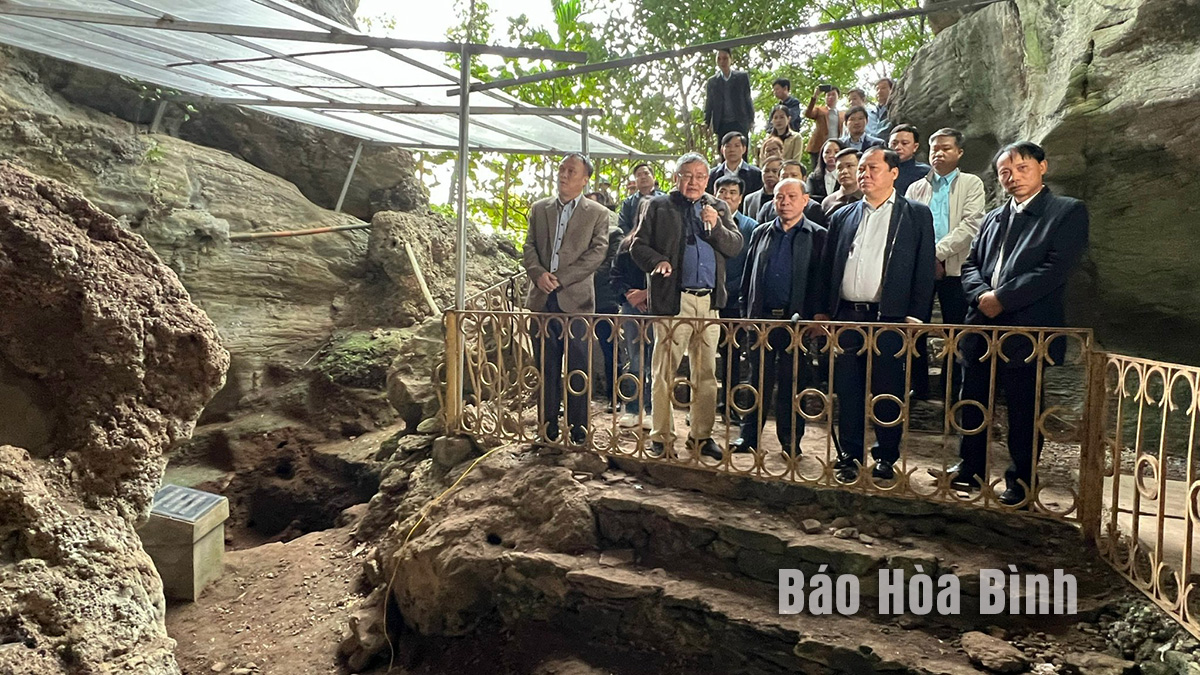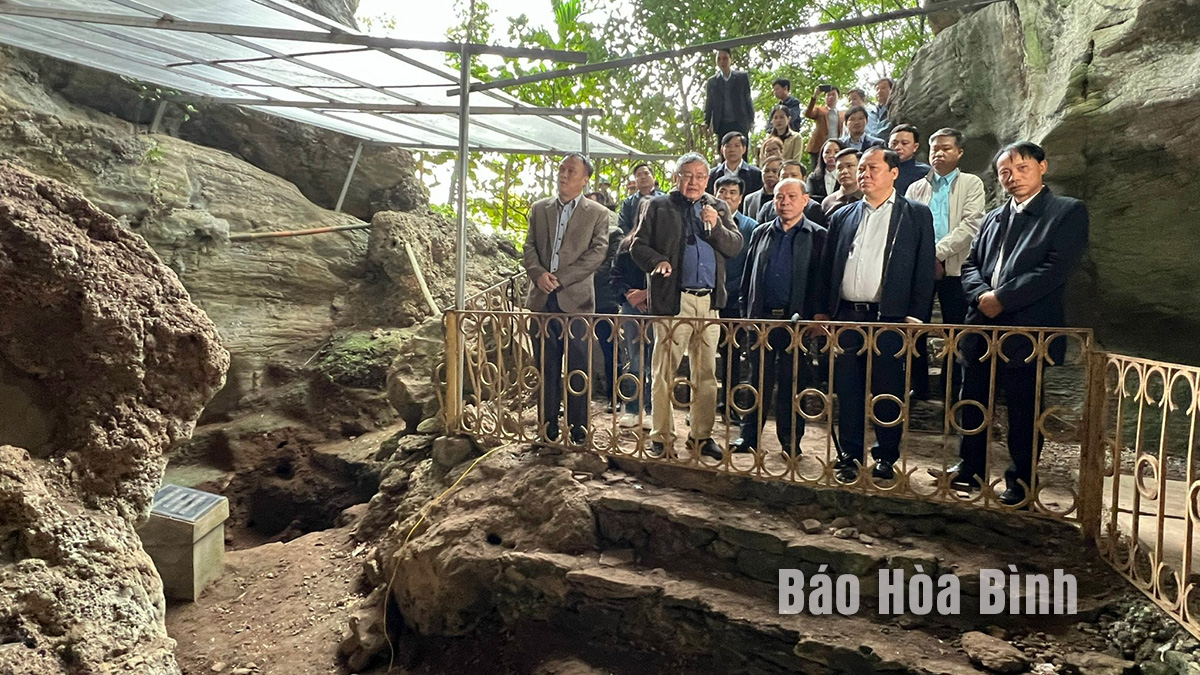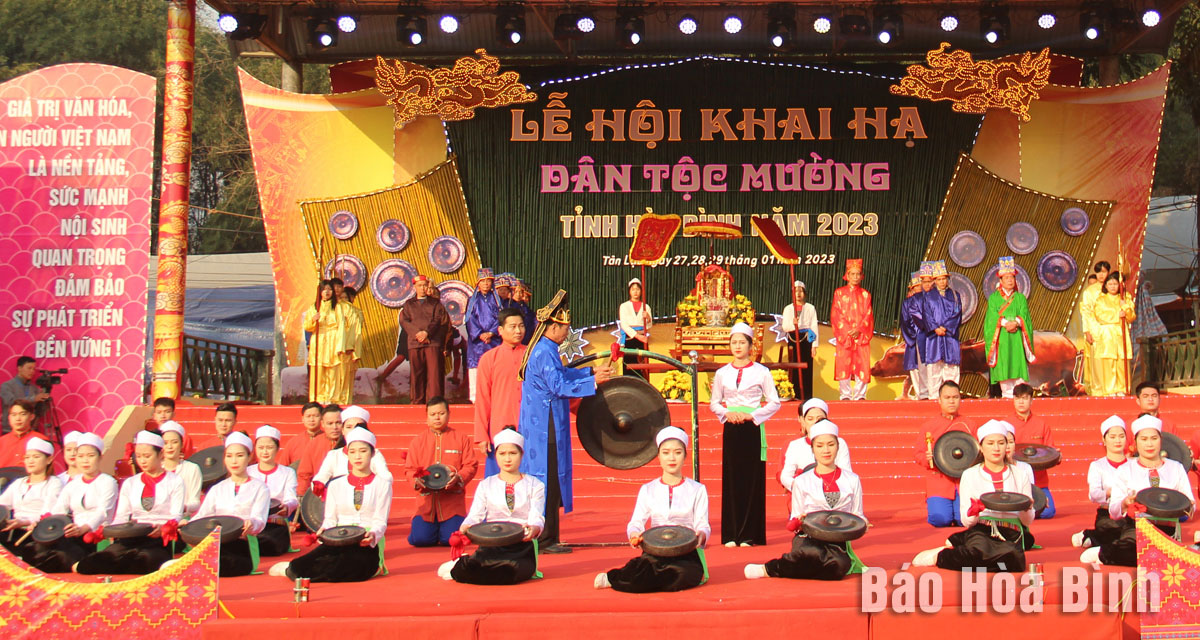
Hoa Binh province’s Party Committee, administrations at all levels, and people have exerted efforts to preserve and uphold the traditionalcultural valuesofthe Muong ethnic minority people, considering this as an important task to contribute to the locality’s development.
Secretary of the provincial Party
Committee Nguyen Phi Long, and other officials make a field trip to Trai hamlet
cave in Tan Lap commune (Lac Son district).
Khai Ha festival of Muong people in Hoa
Binh in 2023.
The local authorities have paid heed to
promoting activities to popularise the Party's directions, the State's policies
and laws on preserving and promoting the cultural values of ethnic groups, and
the contents of the project on conserving and developing the
traditionalcultural valuesofthe Muongpeople, and Hoa
Binh Culture, towards promoting the historical and cultural values to
international friends, and the education of patriotism and national pride among
people.
Developing culture is also considered a
breakthrough, closely associated with the tasks of people building,
socio-economic development, ensuring national defence and security, and foreign
affairs of the province. Hoa Binh will focus on investing in developing modern
cultural institutions, synchronising the system of grassroots-level cultural
institutions to be suitable to the culture of each locality and each ethnic
group, thus preserving and upholding the heritage and cultural values of ethnic
groups.
Additionally, attention will be also paid to
effectively implementing a project to preserve and promote the
traditionalcultural valuesofthe Muongpeople, and Hoa
Binh Culture in the 2023 – 2030 period.
A project to construct a conservation area of
the Muong ethnic cultural space associated with tourism development will be
implemented in Tan Lac district.
The locality is building dossiers to
seekrecognition for the Vanh village stone shelter in Yen Phu commune and
Trai hamlet cave in Tan Lap commune of Lac Son district as special national
archaeological relics, and UNESCO’s recognition for Hoa Binh Culture as a
cultural heritage of humanity. A scientific dossier for Mo Muong to be included
in the UNESCO List of Intangible Cultural Heritage in Need of Urgent
Safeguarding will be completed.
Financial sources from the local budget will be
allocated annually for the preservation work of the traditionalcultural
and heritage valuesofthe Muongpeople and Hoa Binh Culture.
Relevant agencies, sectors and organisations
will work closely to improve the effectiveness of the movement of "All people
stay united to build the cultural life” in the locality.
The Standing Board of the Hoa Binh provincial Party Committee has agreed in principle on a proposal by the Standing Board of the Party Committee of Hoa Binh city to gather feedback on the city’s 1:2000 zoning plan, which forms part of its broader urban development strategy.
Hoa Binh province has made notable progress in public administration reform and digital government development, with the satisfaction index among citizens and businesses reaching over 84%, according to recent government evaluations.
Thanks to great efforts by local authorities in recent times, the governance and public administration performance of Mai Chau district has been significantly improved.
In the afternoon of June 6, the Party Committee, the People's Council, the People's Committee and the Fatherland Front of Lac Son district solemnly held a meeting to celebrate the 139th anniversary of the district's founding (1886–2025) and the 79th anniversary of the establishment of the district's Party Committee (1946–2025). There was the attendance of Mr. Bui Van Thang, the Vice Chairman of the Provincial People's Council; Mr. Quach Tat Liem, the Vice Chairman of the Provincial People's Committee; Ms. Dang Bich Ngoc, the Deputy Head of the National Assembly Delegation of the province; as well as the former leaders of the province and district through various periods, who are the natives of the district.
Implementing the Politburo’s Resolution No. 57-NQ/TW on breakthroughs in science – technology, innovation, and digital transformation is a golden opportunity for the northern mountainous province of Hoa Binh to renew growth model, improve competitive edge and shorten digital gap.
Resolution 57-NQ/TW, issued by the Politburo on December 22, 2024, identifies sci-tech, innovation, and digital transformation as strategic breakthroughs to build a developed and prosperous nation. In Hoa Binh province, this spirit is not just a slogan, it’s being put into action through concrete initiatives that form a "new development triangle”: digital citizenship, digital economy, and digital administration.




